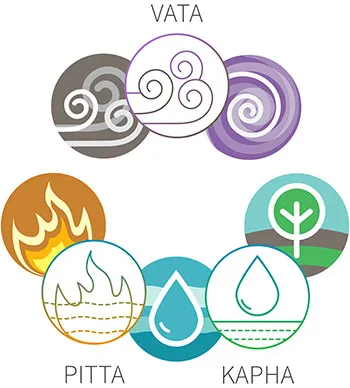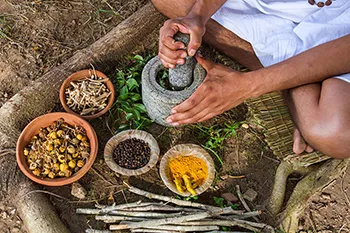What Is Ayurveda?

Originating from the Indian subcontinent, Ayurvedic Medicine (or simply Ayurveda) is a traditional plant-based healing system. The name Ayurveda comes from the Sanskrit words Ayur meaning life and veda meaning knowledge, so together they translate to knowledge of life. Dating back over 3,000 years, it is said to be one of the world’s oldest healing systems and is still practised today, although now it is considered more to be a complementary or alternative medicine to cleanse your digestive system.
Ayurveda is based on the idea of the delicate balance between the mind, body and spirit and how your overall health and wellbeing is tied to that equilibrium. Therefore, it works to complement each of these three areas in order to keep them in balance to promote good overall health, instead of fighting specific diseases as modern medicine would. This is why Ayurveda encourages a certain lifestyle so that you don’t become ill due to an imbalance or when menopause causes weight loss.
How Does Ayurveda Work?
Ayurveda works by finding a good balance between the body and mind in order to keep you healthy. If your body may not be in balance, then you will need an Ayurvedic treatment to help. Most of these treatments begin with a complete body cleanse to get rid of toxins from your insides and digestive system. After this, the traditional treatment will follow with a specific diet with herbal remedies made out of Ayurvedic ingredients as well as exercises such as meditation and yoga. Overall, all of this helps boosts the immune system and aims to eliminate impurities, reduce any symptoms, keep your immune system in check, reduce stress and overall promote harmony between the mind, body and spirit.
The 3 Doshas & Your Ayurvedic Body Type

Those that practice traditional Ayurveda believe that each and every person is comprised of five universal elements: Earth, Water, Fire, Air and Space. These are combined in the human body to create three energies known as Doshas. These determine how your specific body works and, although they believe everyone has a mix of all three, there is usually one that is stronger and gives you your personal Ayurvedic body type and way to best care for your body. Each dosha controls a different bodily function, so your chances of getting certain health issues depends on the balance of your specific doshas.
Vata Dosha (Space & Air)
Said to be the most powerful of the three doshas, Vata Dosha controls basic functions such as cell division as well as blood flow, breathing, heart, mind and waste disposal through the intestines. If Vata Dosha is your main life force, you may be more likely to develop issues such as arthritis, asthma, anxiety and heart and skin problems. The main causes that are believed could disrupt this life force include grief, fear and lack of sleep.
Pitta Dosha (Fire & Water)
The Pitta Dosha energy controls metabolism, digestion and hormones related to appetite. As a result, if it is your main life force you could be more likely to develop issues such as infections, high blood pressure, heart disease and Chrohn’s disease. The most common causes that are thought to disrupt the Pitta Dosha energy force include overexposure to the sun and eating foods that are too spicy or sour.
Kapha Dosha (Water & Earth)
The third and final energy, called Kapha Dosha, controls weight, the immune system, body strength and muscle growth. If this is your main energy source, you would, therefore, be more likely to develop issues such as cancer, obesity, breathing problems, nausea and diabetes. There are many ways to disrupt the Kapha Dosha life force, but the main ways include consuming too much salt, sugar or water and sleeping during the day.

Vata Dosha (Space & Air)
Controls blood flow, breathing, heart, mind and waste disposal.
Leads to issues such as arthritis, asthma, anxiety and heart and skin problems.Caused by grief, fear and lack of sleep.

Pitta Dosha (Fire & Water)
Controls metabolism, digestion and hormones related to appetite.
Leads to issues such as infections, high blood pressure, heart disease and Chrohn’s disease.Caused by overexposure to the sun and eating foods that are too spicy or sour.

Kapha Dosha (Water & Earth)
Controls weight, the immune system, body strength and muscle growth.
Leads to issues such as cancer, obesity, breathing problems, nausea and diabetes.Caused by consuming too much salt, sugar or water and sleeping during the day.
Why Is Food So Important In Ayurveda?

Unlike in Western society where food is mainly seen as a source of fuel that we need to sustain ourselves, those that practice Ayurveda see it as so much more. They believe that if we eat the right balance of healthy food, we can thrive and feed our bodies as well as our minds and spirits.
Ayurveda bases what we eat on six distinct tastes: sweet, salty, sour, bitter, pungent and astringent. Each of these plays a defined role within the body and if we have a complete meal that contains all six tastes, then we will be satisfied in our body as well as our mind and spirit. This is why many Ayurvedic foods are full of a whole range of plants, herbs and spices so that they can meet each taste in one meal and hit your health goals.
Traditional Ayurvedic Medicines & Ingredients
In order to meet all 6 tastes, there are many different Ayurvedic foods that are popularly used in the practices and medicines of Ayurveda. There are said to be over 600 herbs that are used in Ayurvedic medicine each with their different tastes, benefits and uses, but the most common include:
- Ashwagandha
- Bramhi
- Ginger
- Black Pepper
- Ghee (Clarified Butter)
- Cardamon
- Cumin
- Amalaki
- Neem
- Triphala
- Arjuna
- Shatavari
- Guggal
- Haritaki
- Gotu Kola
- Manjistha
- Turmeric
- Amla
Overview
Ayurveda is an amazing practice and is a great way to colon health and wellbeing. Whilst it isn’t intended to cure specific diseases, so you will still need Western medicine for those, Ayurvedic ingredients and practices to help keep your body in balance can be an excellent way to look after yourself for a healthier, happier and more balanced life.







